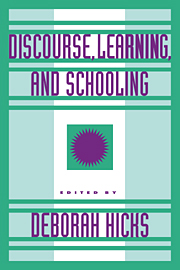Book contents
- Frontmatter
- Contents
- List of Contributors
- Acknowledgments
- 1 Introduction
- Part I Classroom discourses
- Part II Literacy, psychology, and pedagogy
- Part III Discourse and literacies
- Afterword
- 10 Vygotsky and current debates in education: some dilemmas as afterthoughts to Discourse, Learning, and Schooling
- Index
10 - Vygotsky and current debates in education: some dilemmas as afterthoughts to Discourse, Learning, and Schooling
Published online by Cambridge University Press: 03 May 2010
- Frontmatter
- Contents
- List of Contributors
- Acknowledgments
- 1 Introduction
- Part I Classroom discourses
- Part II Literacy, psychology, and pedagogy
- Part III Discourse and literacies
- Afterword
- 10 Vygotsky and current debates in education: some dilemmas as afterthoughts to Discourse, Learning, and Schooling
- Index
Summary
Vygotsky, or at least the ideas he has bequeathed to sociocultural theories of language, literacy, and cognition, is at the center of much of this volume. The intersection of Vygotsky's ideas and current educational debates are central as well – for example, the distinctions and relations between what we acquire through immersion in communities and what we learn through more typically school-like sorts of instruction. There is, too, in many of the chapters (as in much recent work in the area), a sense that we are looking for ways to move on from where Vygotsky has left us without losing the ground he has helped secure. It is to these themes that I want to turn in some afterthoughts on this volume.
Although Vygotsky's ideas are at the foundation of contemporary sociocultural theories of language and literacy, I believe we are just beginning to realize the extent to which these ideas raise profound dilemmas deeply relevant to current controversies over educational reform. Thus, before I turn directly to Vygotsky, I want to sketch one such controversy now playing itself out in much of the English-speaking world. This is the debate between progressive and postprogressive pedagogies: a distinction that sometimes turns on arguments about the role and efficacy of explicit instruction in contrast to implicit learning through immersion in rich education environments.
Those on both the right and the left of the political spectrum have called for a renewed emphasis on explicit instruction.
- Type
- Chapter
- Information
- Discourse, Learning, and Schooling , pp. 269 - 282Publisher: Cambridge University PressPrint publication year: 1996
- 11
- Cited by



